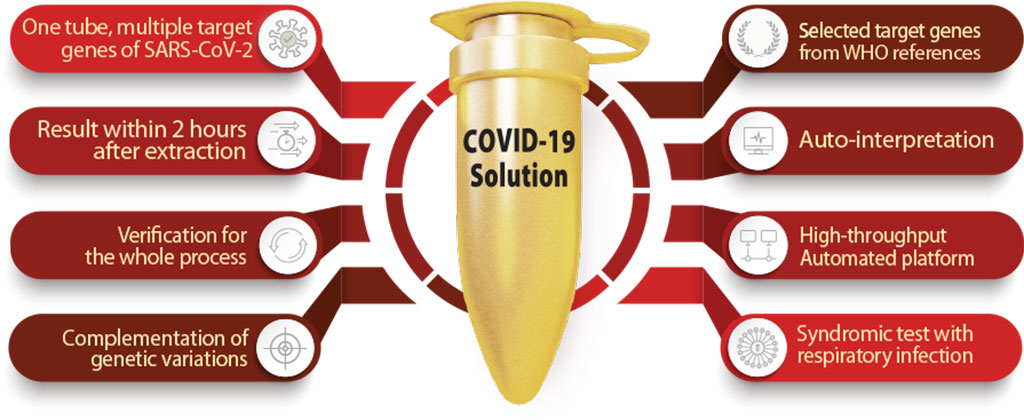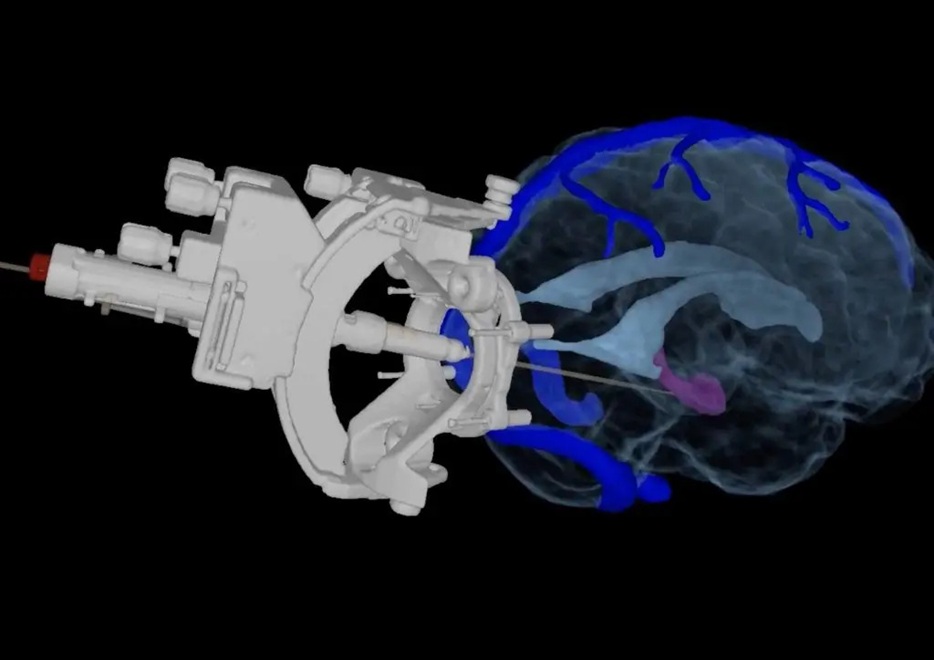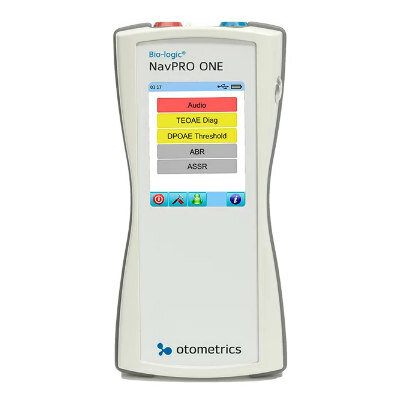Seegene Develops World’s First COVID-19 Mutant Identification Test
|
By HospiMedica International staff writers Posted on 02 Feb 2021 |

Image: Allplex™ 2019-nCoV Assay (Photo courtesy of Seegene, Inc.)
Seegene, Inc. (Seoul, Korea) has developed the world's first COVID-19 diagnostic variant test, capable of screening COVID-19 and identifying multiple mutant variations in a single reaction.
Seegene's new variant test, the Allplex SARS-CoV-2 Variants I Assay, can detect and differentiate virus variations, including those found to be more contagious and fatal. The new variant test not only detects COVID-19, but can also identify major genetic variations that seem to have originated from the UK, South Africa as well as other regions including Japan and Brazil. Furthermore, it can pre-screen a suspicious new variant, providing insight on additional variations, also a key feature of Seegene technology.
Seegene's new product integrates at least 10 of its proprietary technologies, including multiplex real-time PCR method of mTOCE, which is the cutting-edge technology that only the company can leverage. This innovative technology allows the test to detect a target specific spot where mutation occurs, enabling precise detection and differentiation of the coronavirus as well as its mutated versions with a single tube of reagent.
Another key feature using Seegene's unique technology is its endogenous internal control that can verify entire testing process including proper sample collection. By utilizing Seegene's big data auto-surveillance in silico system, the company is closely monitoring and analyzing worldwide database on COVID-19 and its variants, allowing it to quickly respond with product development.
The "new COVID-19 diagnostic variant test will significantly boost massive testing ability in its fight against the global-spread of mutant viruses when the time is key to controlling the pandemic," said an official from Seegene. According to the company official, Seegene plans "to supply its COVID-19 variant tests to global organizations and governments as its priority." The official added that the company will continue its work to "fulfill the duty as a leading global molecular diagnostics company by closely working with health authorities around the world."
Seegene's new variant test, the Allplex SARS-CoV-2 Variants I Assay, can detect and differentiate virus variations, including those found to be more contagious and fatal. The new variant test not only detects COVID-19, but can also identify major genetic variations that seem to have originated from the UK, South Africa as well as other regions including Japan and Brazil. Furthermore, it can pre-screen a suspicious new variant, providing insight on additional variations, also a key feature of Seegene technology.
Seegene's new product integrates at least 10 of its proprietary technologies, including multiplex real-time PCR method of mTOCE, which is the cutting-edge technology that only the company can leverage. This innovative technology allows the test to detect a target specific spot where mutation occurs, enabling precise detection and differentiation of the coronavirus as well as its mutated versions with a single tube of reagent.
Another key feature using Seegene's unique technology is its endogenous internal control that can verify entire testing process including proper sample collection. By utilizing Seegene's big data auto-surveillance in silico system, the company is closely monitoring and analyzing worldwide database on COVID-19 and its variants, allowing it to quickly respond with product development.
The "new COVID-19 diagnostic variant test will significantly boost massive testing ability in its fight against the global-spread of mutant viruses when the time is key to controlling the pandemic," said an official from Seegene. According to the company official, Seegene plans "to supply its COVID-19 variant tests to global organizations and governments as its priority." The official added that the company will continue its work to "fulfill the duty as a leading global molecular diagnostics company by closely working with health authorities around the world."
Latest COVID-19 News
- Low-Cost System Detects SARS-CoV-2 Virus in Hospital Air Using High-Tech Bubbles
- World's First Inhalable COVID-19 Vaccine Approved in China
- COVID-19 Vaccine Patch Fights SARS-CoV-2 Variants Better than Needles
- Blood Viscosity Testing Can Predict Risk of Death in Hospitalized COVID-19 Patients
- ‘Covid Computer’ Uses AI to Detect COVID-19 from Chest CT Scans
- MRI Lung-Imaging Technique Shows Cause of Long-COVID Symptoms
- Chest CT Scans of COVID-19 Patients Could Help Distinguish Between SARS-CoV-2 Variants
- Specialized MRI Detects Lung Abnormalities in Non-Hospitalized Long COVID Patients
- AI Algorithm Identifies Hospitalized Patients at Highest Risk of Dying From COVID-19
- Sweat Sensor Detects Key Biomarkers That Provide Early Warning of COVID-19 and Flu
- Study Assesses Impact of COVID-19 on Ventilation/Perfusion Scintigraphy
- CT Imaging Study Finds Vaccination Reduces Risk of COVID-19 Associated Pulmonary Embolism
- Third Day in Hospital a ‘Tipping Point’ in Severity of COVID-19 Pneumonia
- Longer Interval Between COVID-19 Vaccines Generates Up to Nine Times as Many Antibodies
- AI Model for Monitoring COVID-19 Predicts Mortality Within First 30 Days of Admission
- AI Predicts COVID Prognosis at Near-Expert Level Based Off CT Scans
Channels
Critical Care
view channel
Flexible Semi-Autonomous Robot Could Deliver Medicine Inside Body
Soft robotics, in contrast to traditional rigid robots, are composed of flexible materials that mimic the movements of living organisms. This inherent flexibility makes them well-suited for navigating... Read more
Handheld Device Could Transform Heart Disease Screening
Heart valve disease (VHD), also known as valvular heart disease, has been described as the “next cardiac epidemic” due to its prognosis being worse than many cancers. Approximately 50% of patients with... Read more
Gene Discovery Could Help Grow New Heart Arteries
The human heart receives blood and oxygen from several coronary arteries, with the two main arteries located on the front of the heart on the right and left sides. To supply oxygenated blood to the back... Read more
Neurorestorative Treatment Strategies Hold Promise for Most Severe Forms of Epilepsy
Epilepsy affects approximately 50 million people worldwide, with around 30% of these individuals, or roughly 15 million people, suffering from drug-resistant epilepsy (DRE). While some patients experience... Read moreSurgical Techniques
view channel
New Transcatheter Valve Found Safe and Effective for Treating Aortic Regurgitation
Aortic regurgitation is a condition in which the aortic valve does not close properly, allowing blood to flow backward into the left ventricle. This results in decreased blood flow from the heart to the... Read more
Minimally Invasive Valve Repair Reduces Hospitalizations in Severe Tricuspid Regurgitation Patients
The tricuspid valve is one of the four heart valves, responsible for regulating blood flow from the right atrium (the heart's upper-right chamber) to the right ventricle (the lower-right chamber).... Read morePatient Care
view channel
Portable Biosensor Platform to Reduce Hospital-Acquired Infections
Approximately 4 million patients in the European Union acquire healthcare-associated infections (HAIs) or nosocomial infections each year, with around 37,000 deaths directly resulting from these infections,... Read moreFirst-Of-Its-Kind Portable Germicidal Light Technology Disinfects High-Touch Clinical Surfaces in Seconds
Reducing healthcare-acquired infections (HAIs) remains a pressing issue within global healthcare systems. In the United States alone, 1.7 million patients contract HAIs annually, leading to approximately... Read more
Surgical Capacity Optimization Solution Helps Hospitals Boost OR Utilization
An innovative solution has the capability to transform surgical capacity utilization by targeting the root cause of surgical block time inefficiencies. Fujitsu Limited’s (Tokyo, Japan) Surgical Capacity... Read more
Game-Changing Innovation in Surgical Instrument Sterilization Significantly Improves OR Throughput
A groundbreaking innovation enables hospitals to significantly improve instrument processing time and throughput in operating rooms (ORs) and sterile processing departments. Turbett Surgical, Inc.... Read moreHealth IT
view channel
Printable Molecule-Selective Nanoparticles Enable Mass Production of Wearable Biosensors
The future of medicine is likely to focus on the personalization of healthcare—understanding exactly what an individual requires and delivering the appropriate combination of nutrients, metabolites, and... Read more
Smartwatches Could Detect Congestive Heart Failure
Diagnosing congestive heart failure (CHF) typically requires expensive and time-consuming imaging techniques like echocardiography, also known as cardiac ultrasound. Previously, detecting CHF by analyzing... Read moreBusiness
view channel
Expanded Collaboration to Transform OR Technology Through AI and Automation
The expansion of an existing collaboration between three leading companies aims to develop artificial intelligence (AI)-driven solutions for smart operating rooms with sophisticated monitoring and automation.... Read more



















